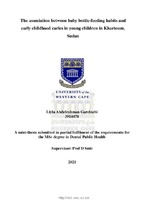| dc.contributor.advisor | Smit, Dirk | |
| dc.contributor.author | Garelnabi, Liyla Abdelrahman | |
| dc.date.accessioned | 2022-02-28T12:04:53Z | |
| dc.date.available | 2022-02-28T12:04:53Z | |
| dc.date.issued | 2021 | |
| dc.identifier.uri | http://hdl.handle.net/11394/8751 | |
| dc.description | Magister Chirurgiae Dentium (MChD) | en_US |
| dc.description.abstract | Early childhood caries (ECC) is one of the most common chronic infectious diseases affecting early childhood. It has a multifactorial aetiology and is difficult to control on a population scale. Feeding habits, throughout the first year of life, involve several simultaneous and consistent behaviours, such as breastfeeding, bottle-feeding and the introduction of complementary foods. Particular feeding behaviours recognized at this age may be maintained in later years, potentially impacting health over the life course. The following study was done to interrogate bottle-feeding practices among caregivers in Khartoum and to determine if there was an association with the prevalence of dental caries among young children. | en_US |
| dc.language.iso | en | en_US |
| dc.publisher | University of Western Cape | en_US |
| dc.subject | Baby bottle-feeding | en_US |
| dc.subject | Caregivers | en_US |
| dc.subject | Cariogenic diet | en_US |
| dc.subject | Toothbrushing | en_US |
| dc.subject | Sudan | en_US |
| dc.title | The association between baby bottle-feeding habits and early childhood caries in young children in Khartoum, Sudan | en_US |
| dc.rights.holder | University of Western Cape | en_US |

